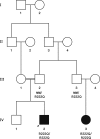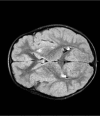SGPL1 Deficiency: A Rare Cause of Primary Adrenal Insufficiency
- PMID: 30517686
- PMCID: PMC6435096
- DOI: 10.1210/jc.2018-02238
SGPL1 Deficiency: A Rare Cause of Primary Adrenal Insufficiency
Abstract
Context: Multiple autosomal recessive genes have been etiologically linked to primary adrenal insufficiency (PAI). Recently, sphingosine-1-phosphate lyase 1 (SGPL1) gene mutations were recognized as a cause of steroid-resistant nephrotic syndrome type 14 (NPHS14), a sphingolipidosis with multisystemic manifestations, including PAI.
Objective: To check if SGPL1 mutations are involved in the pathogenesis of PAI in patients who do not exhibit nephrotic syndrome.
Methods: Sequencing of the SGPL1 gene in 21 patients with familial glucocorticoid disease or triple A syndrome.
Results: We identified two missense SGPL1 variants in four patients, two of whom were first cousins. We describe in detail the proband, a boy born to Saudi Arabian consanguineous parents with a homozygous c.665G>A, p.R222Q SGPL1 variant. The patient presented with hypoglycemia and seizures at age 2 years and was ultimately diagnosed with PAI (isolated glucocorticoid deficiency). Brain MRI showed abnormalities in the basal ganglia consistent with a degenerative process albeit the patient had no neurologic symptoms.
Conclusions: New genetic causes of PAI continue to be identified. We suggest that screening for SGPL1 mutations should not be reserved only for patients with nephrotic syndrome but may also include patients with PAI who lack other clinical manifestations of NPHS14 because, in certain cases, kidney disease and accompanying features might develop. Timely diagnosis of this specific sphingolipidosis while the kidneys still function normally can lead to prompt initiation of therapy and improve outcome.
Published by Oxford University Press on behalf of the Endocrine Society 2019.
Figures



References
-
- Betterle C, Dal Pra C, Mantero F, Zanchetta R. Autoimmune adrenal insufficiency and autoimmune polyendocrine syndromes: autoantibodies, autoantigens, and their applicability in diagnosis and disease prediction. Endocr Rev. 2002;23(3):327–364. - PubMed
-
- Flück CE. Mechanisms in endocrinology: update on pathogenesis of primary adrenal insufficiency: beyond steroid enzyme deficiency and autoimmune adrenal destruction. Eur J Endocrinol. 2017;177(3):R99–R111. - PubMed
-
- Chabre O, Goichot B, Zenaty D, Bertherat J Epidemiology of primary and secondary adrenal insufficiency: Prevalence and incidence, acute adrenal insufficiency, long-term morbidity and mortality. Ann Endocrinol (Paris). 2017;78(6):490–494. - PubMed
-
- Malikova J, Flück CE. Novel insight into etiology, diagnosis and management of primary adrenal insufficiency. Horm Res Paediatr. 2014;82(3):145–157. - PubMed
-
- Charmandari E, Nicolaides NC, Chrousos GP. Adrenal insufficiency. Lancet. 2014;383(9935):2152–2167. - PubMed
Publication types
MeSH terms
Substances
Grants and funding
LinkOut - more resources
Full Text Sources
Medical
Molecular Biology Databases

